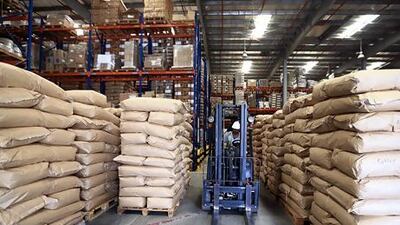The smell hits you the moment you enter the building - the unmistakable scent of tea.
Down the corridor and through a few doors lies a warehouse stocked with more than 5,000 metric tonnes of tea, originating from such places as Uganda, Sri Lanka and India.
The Dubai Tea Trading Centre (DTTC), an initiative of the Dubai Multi Commodities Centre located in Jebel Ali Free Zone, was set up in 2005 to support the industry.
In a couple of years the UAE had grown to become the world's second largest re-exporter of tea.
It is now the biggest and is projected to keep on growing. "We are in the middle of all major trade routes across the world, so if you look at the trade routes of the tea-producing countries versus the tea-consuming countries, there is clearly Dubai at the centre," said Sanjeev Dutta, the director of the centre.
"That's the growth story of the Emirates. And that is one of the reasons why Dubai International, Dubai World Central, will be the busiest airports in the world going forward."
Twenty-five companies, including the major tea growers, such as McLeod Russel, the world's biggest tea producer, and brands, use the facility as a base.
"Basically what happens is there are two sides to it, bulk teas come in and bulk teas go out without anything, without value addition. When I refer to value addition it is more to do with blending," said Mr Dutta.
"There is a predetermined blend sheet and quality requirement. Once the tea has been blended, a lot of those teas could get value added as in terms of converted into loose leaf bags or the tea bags that we have in the market.
A lot of those blends are re-exported."
Traditionally, tea was shipped directly from producing countries to consuming countries.
But over the years, because of people's palates and pockets, multi-origin teas, which are cheaper, have become more popular.
"It's like saying if you can't afford a pure gold ornament, why not have a gold-plated silver ornament," said Mr Dutta.
However, many countries have regulations against making multi-origin blends because they affect the industry in the tea producing destinations.
"What the regime states in most producing countries is, you can get multi-origin teas, but you have to export it 100 per cent, otherwise there is a hefty duty.
"That's where I think Dubai and more particularly DTTC plays a predominant role. You can do multi-origin blends," said Mr Dutta.
It is partly because of this reason that DTTC is growing so fast, at 20 per cent year on year.
It expects to record 7.5 million kilograms of re-exports through the centre this year, and is already well on its way to the target.
"During the first five months of the year we have done over 5 million kilos of tea," said Mr Dutta.
"We are looking at extending internally.
"I can't divulge the details but we are working on several projects which would see our volumes grow manifold, in which case we don't rule out the possibility of additional warehouse space," he added.
And that is not the only part of DTTC that is growing.
The centre has just set up a joint venture with Gundlach Packaging, a German tea printing and publishing company, to set up a facility next to DTTC which specialises in printing the tags and envelopes for tea bags.
"It's a very niche business. Because of its complexity and investment, there is no other supplier or printer of tea tags in the Middle East.
"There is a gap in the market. We realised this many years ago," said Sanjay Sethi, the director of Gundlach Packaging.
"We compliment their business. When people come to us and they are not dealing with DTTC, we introduce them to DTTC," he added.


